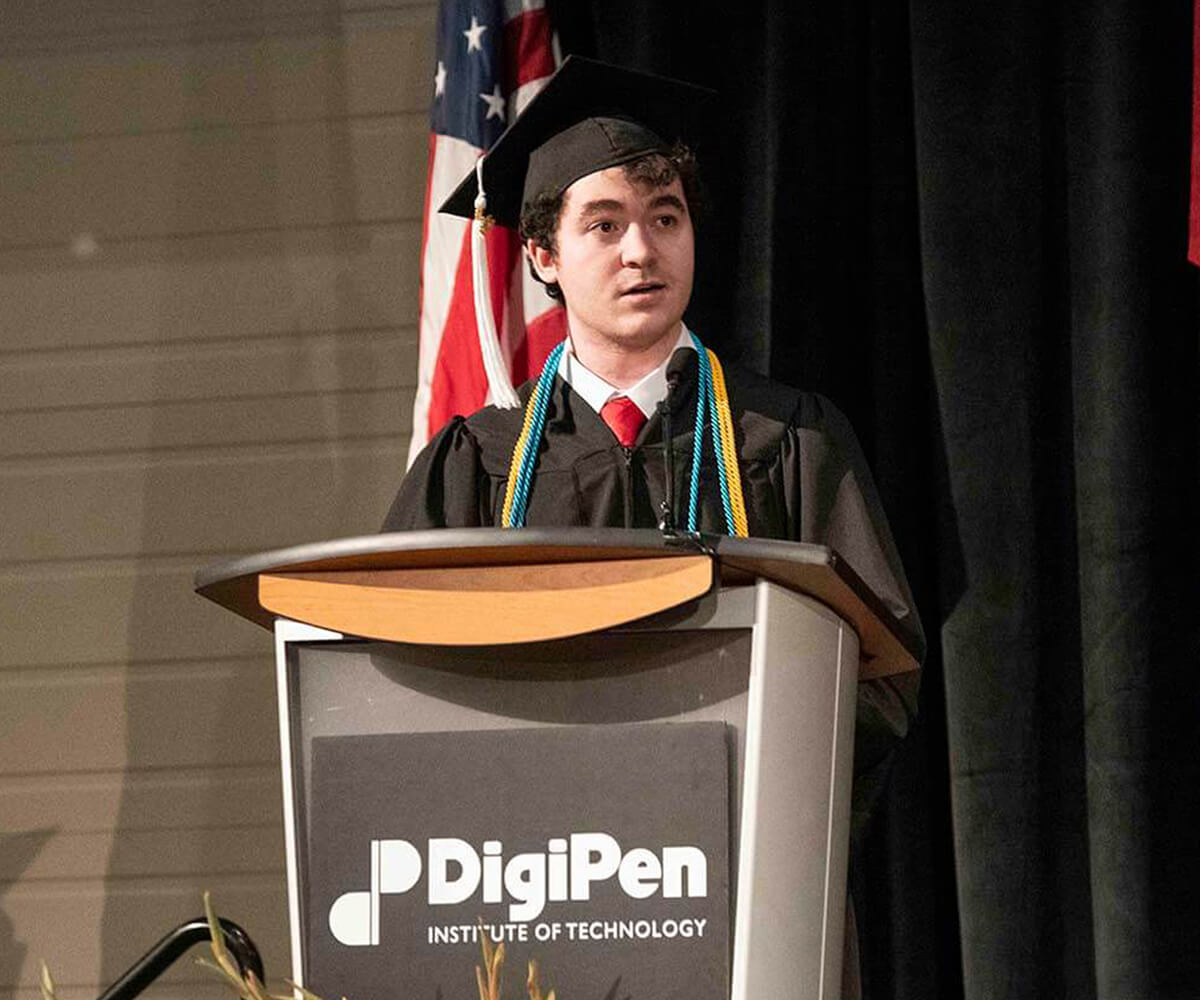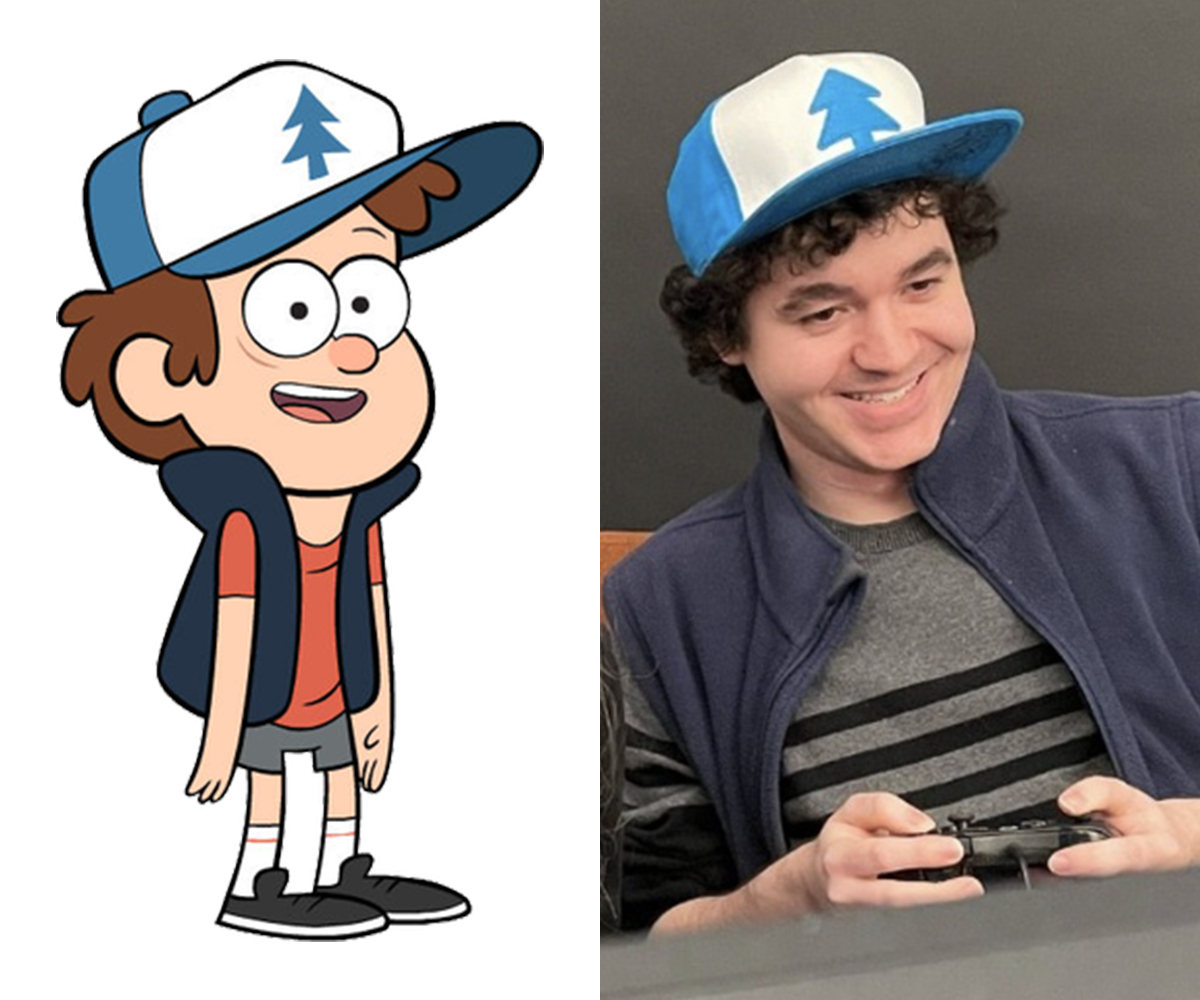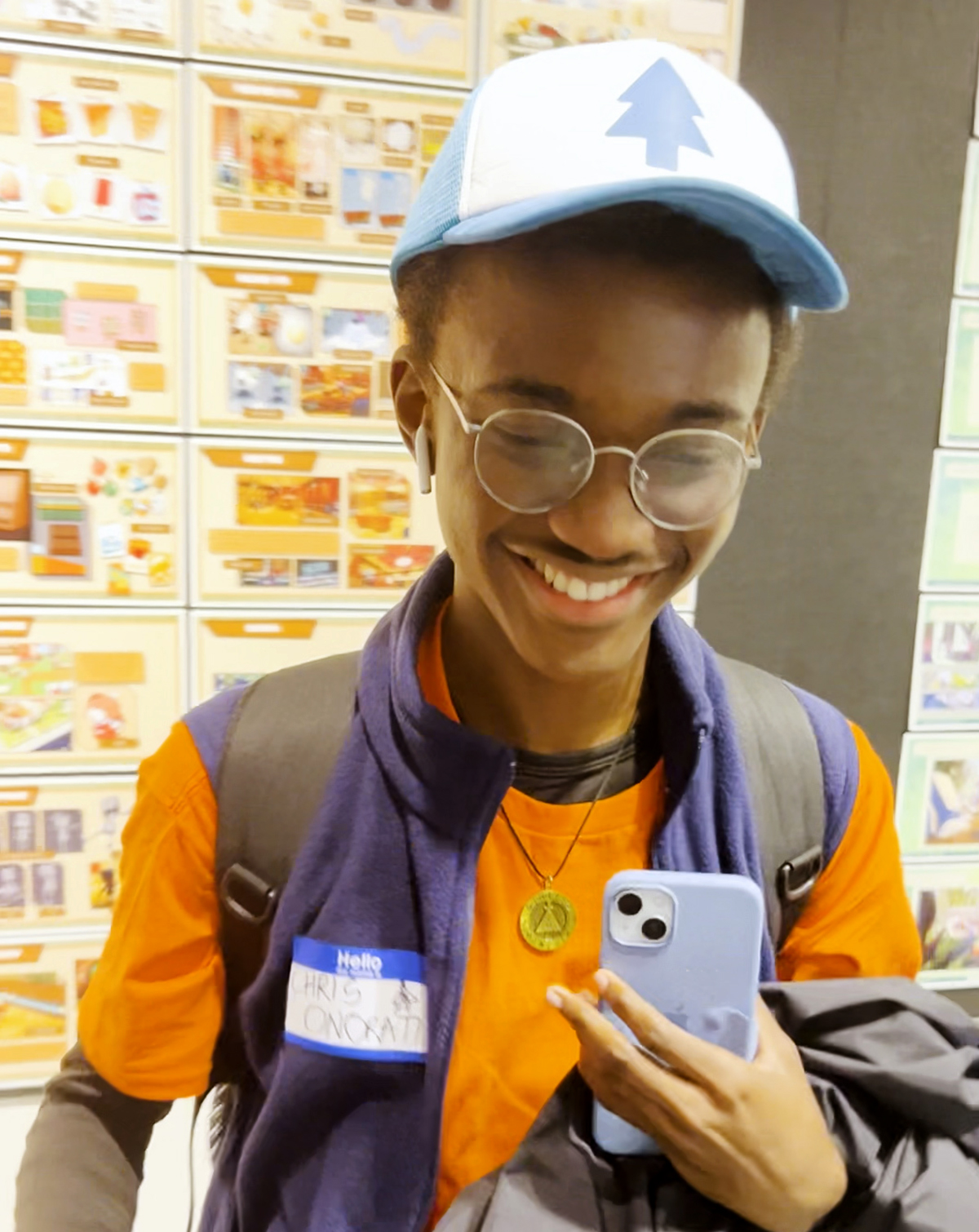At the end of each school year, the DigiPen Student Union votes to determine the winners of the Student Life Excellence Awards, recognizing Dragons who go above and beyond in their contributions to the campus community. DigiPen lab manager Chris Onorati has won three times in two separate categories, once as Student of the Year in 2018, and twice, consecutively, for Staff of the Year in 2020 and 2021. When asked why he thinks he’s been so highly decorated on campus, he first expresses gratitude that he hasn’t won any further Student Life Excellence Awards.
“Please! All the other awesome, helpful people here need to get recognized!” he says. “But the modest answer is, as the lab manager, I’m probably just one of the most easily accessible people on campus since I spend 90% of my time where students are. That, and I suppose I’m easily recognizable, since I wear the same blue Dipper Pines hat and vest from Gravity Falls every day.” As fate would have it, Onorati’s outsized impact on DigiPen campus life, and his deep, wardrobe-altering love for the animated series Gravity Falls may never have happened if it weren’t for a bunch of dust.
In high school, Chris Onorati got hooked on the Portal series, spending hours in his room puzzling through the two landmark games on his PC. “I was but a wee child and did not realize computers need to be cleaned,” he says. “So, dust built up on my graphics card and basically deep fried it.” While his parents battled on his behalf to get the manufacturer to honor the part warranty, Onorati made do by booting up the only part of the game that would still run without his graphics card — the Portal 2 Puzzle Creator. “Through 10th and 11th grade, while my computer was out of commission, basically all I could do was make levels for Portal 2. Eventually, I found I liked making stuff for games more than playing them,” Onorati says.
By senior year of high school, Onorati had made enough of a name for himself in the game’s modding community that he was recruited by UK indie developer Prism Studios to work on an entirely new Portal 2 fan game, Portal Stories: Mel, that later won the 2015 Game Award for Best Fan Creation. Through his work, he connected on forums with one of Portal’s original developers, Jeep Barnett. “I asked him, ‘If I want to get into this professionally, what would you recommend?’ He told me he went to a school called DigiPen that I should check out,” Onorati says.
Onorati quickly learned that both Portal and Portal 2 started out as DigiPen student games, created by two teams (one including Barnett) that were hired en masse by Valve after company reps saw the innovative mechanics in their projects on campus in 2005 and 2008. An established Portal creator himself, Onorati decided to enroll in DigiPen’s BA in Game Design program in 2014.
Freshman year, Onorati began developing the vocabulary to describe many of the game design principles he’d already intuited through his extensive Portal modding experiences. But there was still lots to learn. “Coming in, my skillset was, if you wanted a Portal 2 puzzle, I was super good at that. If you wanted anything else, I had no idea,” Onorati says. Although working with the Portal 2 level editor in high school had given him a leg up on game design in some ways, it also hid lots of the complexity of professional game development. “I’d never done a lick of programming, and I remember this project where we had to do coding to make a checkpoint for the player to spawn at when they die,” Onorati says. “I was like, ‘That’s stupid! In Portal 2, I just put a spawn entity down in the level editor and it works automatically. What do you mean you have to code that yourself when you make a game?’”
Eventually, Onorati fell in love with coding, taking as many programming electives as possible in addition to his primary design course load. “I came in thinking I just wanted to be a level designer and do that full speed ahead,” Onorati says. “But having the power to code games myself and not be reliant on someone else got me really into being a hybrid level and technical designer.” Onorati put his new programming skills to use on his student games Swapgoats and Utomah, quickly coding in design ideas himself without having to bother programmers focused on more complex technical challenges. Utomah went on to sweep many of that year’s DigiPen Student Game Awards categories, including Best Sophomore Game.

Nearing graduation, Onorati had developed a reputation on campus not just as a code-capable designer, but as an omnipresent teaching assistant as well, stepping up to help instructors in level design, game project, computer science, and even English courses. “There was one semester where I was TA’ing five different classes, which I don’t think you’re allowed to do anymore,” he laughs. “But I really enjoyed it.” After delivering the student commencement speech at his cohort’s graduation ceremony, he was offered a full-time staff role on campus as the DigiPen lab manager.
So what does being the DigiPen lab manager look like? “The main part of it is playing what I call the most complicated game of Tetris,” Onorati says. In other words, that means figuring out how to properly allocate campus lab space to anywhere from 60 to 75 student game and film teams of varying sizes and needs each semester, a tall order that takes lots of carefully considered planning. Once that’s through, Onorati serves as the first line of defense for IT in the labs — installing plug-ins and updates, replacing broken equipment, and solving software issues for student teams. That often leads to one of Onorati’s favorite, unofficial aspects of the job.
It’s really fun, because I’m able to use the skillset DigiPen gave me to give back to DigiPen.
“When I’m walking around fixing stuff, half the time I get roped into teams asking me for design and programming advice on their games,” Onorati says. “‘While you’re here fixing my mouse, what do you think of this?’ It’s really fun, because I’m able to use the skillset DigiPen gave me to give back to DigiPen.” Onorati also gives back to DigiPen in a big way through the other main aspect of his role — managing the publication of DigiPen student video games on platforms like Steam, itch.io, and most recently, student tabletop games on DriveThruRPG. “Something I’m super passionate about is that we make cool things here! Let’s show them to as many people as we can,” Onorati says. “At this point, I’m pretty sure I hold the world record for the most Stream pages created by a single person. I think I’m at 125 now.”
Two of those 125 games happen to be Onorati’s own original titles, developed as part of his indie game studio, The Rat Zone. The studio’s origins also tie back to his Valve-related passion projects — more specifically, to a desire to push beyond them. Back in 2016, Onorati decided to put his spare summers home from DigiPen to use by volunteering to help design and code levels, AI, and assets for the Valve-sanctioned Half-Life fan remake, Operation: Black Mesa, which he continued to work on for six years. “At the end of 2021, I realized I needed a break from Valve stuff, having worked with their IPs for almost a decade between Portal and Half-Life. Variety is the spice of life!” Onorati says. Remembering a pact he made to start an indie game studio one day with two of his Utomah teammates, Onorati reached out to both in 2022 to make good on their promise. Thus, The Rat Zone was born.
The trio published their first game, the icy exploration horror title, Sender, in August of 2023. “Our artist said he’d eat his shoe if we sold more than 100 copies our first week,” Onorati says. “Lo and behold, we sold 100 copies the first week! He didn’t eat his shoe, but as a startup indie, it ended up being a lot more successful than we expected, so we were motivated by that.”
The Rat Zone’s latest 2024 release, CHAIRS, is a psychedelic, fast-paced platformer where players take control of a chair — an experience its trailer declares to be, “One of the games of all time.” An expanded take on a game jam project his collaborators created at DigiPen, the new title took The Rat Zone about 10 months to develop. “Within three months, it’s sold more than Sender did in a whole year. It’s still doing well!” Onorati says. The game made a splash at September’s Seattle Indies Expo, where it was featured among 32 hand-picked Pacific Northwest indie titles. The Rat Zone is already hard at work on their third title, a cooking game. “You’ll never know what to expect from us!” Onorati says.

One thing folks can reliably expect from Onorati, however, is his remarkably consistent wardrobe — a blue baseball cap emblazoned with a tree, as well as a blue fleece vest. His iconic daily outfit has its origins in his sophomore year at DigiPen, when a close friend on campus suggested he might like a paranormal Disney cartoon series set in Oregon called Gravity Falls. “Maybe they’ve come to regret introducing it to me,” Onorati says. “But they were spot on, and I fell in love with the show.” Noticing he’d spent the entire summer before his junior year binging the show at home, Onorati’s mom gifted him the same blue baseball cap the show’s hero, Dipper Pines, wears throughout the series. “The hat was the first of many,” Onorati says. “I think I’ve gone through about 10 identical Dipper hats now because I wear them so much.”
For his Halloween costume that year, Onorati decided to complete the Dipper Pines look by donning the character’s blue fleece vest. With its sleeveless ease and all-season practicality, Onorati discovered he liked vests far more than the jackets he’d always defaulted to. “Obviously I liked the hat, and then I just decided to stick with the vest more out of utility than an attempt to cosplay. I’m not complaining if people think it’s cosplay though. I love the show!” The outfit has made Onorati an instantly recognizable figure on campus, but he was surprised to discover that it’s also granted him a counter-intuitive superpower. “You read about the Superman disguise with Clark Kent just taking off his glasses and go, ‘No way that works.’ But it totally does,” Onorati laughs. “If I take off the hat and vest, students walk by and don’t recognize me. It’s like I’m able to enter incognito mode and sneak around whenever I want.”

Whether hiding hatless in the shadows or acting in one of the most visible roles on campus, Onorati says his time as both a student and a staff member has given him some unique insights on how to make the most of your time at DigiPen. His first piece of advice is to meet as many people on campus as you can. “DigiPen’s secret weapon is the amazing support system you get from alumni, staff, faculty, and your peers, so take the time to make friends and get out of your comfort zone,” Onorati says. His second piece of advice is to simply do less. “You’re already over-scoping your game. Even before the semester has started, whatever you’re thinking of, it’s already over-scoped, and you should aim for half of that,” he says.
His final piece of advice? Have fun.
“When I walk through the computer labs, there’s a part of me that looks back at my old team space and goes, ‘Ah, I remember that year. I wish I could go back and do it again,’” Onorati says. “DigiPen is a super special environment that I’ve never seen replicated before or since, and you’re only here for a limited time, so enjoy it! Well, I guess I got to stick around, but I’m just lucky.”
